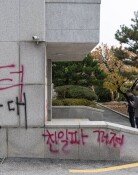Israel attacks Hezbollah’s money, arms, and intelligence facilities
Israel attacks Hezbollah’s money, arms, and intelligence facilities
Posted October. 22, 2024 08:13,
Updated October. 22, 2024 08:13
Israel, which launched a ground war across the border of Lebanon on October 1, has escalated its offensive, including airstrikes on a financial institution believed to provide financial resources to the pro-Iranian militant group Hezbollah. The armed clashes have intensified since the killing of Yahya Sinwar, the top leader of the Palestinian militant group Hamas, on Wednesday, suggesting that a ceasefire is unlikely to come anytime soon, despite mediation by the U.S. and others.
According to Reuters, the Israeli military bombed three branches of the financial institution Al-Qard Al-Hassan in Dahieh, outside Beirut on Sunday night. “The financial institution is involved in financing Hezbollah,” the Israeli military said. Founded in 1983, Al-Qard Al-Hassan has been known as Hezbollah’s financial backer and has been on the U.S. Treasury Department’s sanctions list since 2007. On the same day, Israeli forces also struck Hezbollah’s intelligence facility and underground armory on the outskirts of Beirut, reportedly killing three Hezbollah officials.
The U.S., which faces a presidential election on November 5, has been trying to mediate a ceasefire, asking Israel to scale back its airstrikes, but Israel is apparently not listening. “There are too many civilian casualties (from Israeli attacks),” U.S. Defense Secretary Lloyd Austin said in an unusually strongly worded statement on Saturday. ”I urge Israel to scale back its airstrikes near Beirut.”
Israel also attacked the United Nations Interim Force in Lebanon (UNIFIL), the UN peacekeeping force in southern Lebanon. “Israeli forces bulldozed and deliberately demolished security posts and fences,” the UNIFIL said in a statement on Sunday. ”This violates international law and Security Council resolutions.” The UNIFIL is stationed along Lebanon’s border under the UN Security Council Resolution 1701, which was adopted after 34 days of war in 2006 between Israel and Hezbollah.
Amos Hochstein, a White House senior adviser and U.S. President Joe Biden’s special envoy to the Middle East, is scheduled to travel to Lebanon on Monday to negotiate a ceasefire. Still, some say the ceasefire is unlikely as Israel is stepping up its offensive. Hochstein will meet with Lebanon’s prime minister, an Islamic Sunni, and the speaker of the Lebanese parliament, an Islamic Shiite, to discuss the ceasefire.
이지윤 기자 asap@donga.com
Headline News
- US approves supply of landmines to Ukraine
- Democratic Party moves to impeach prosecutors over non-indictment of first lady
- Record job losses for workers in 40s highlight economic struggles
- Myung suspected of arranging meetings during South Gyeongsang trip
- Guardians’ Stephen Vogt wins AL Manager of the Year







